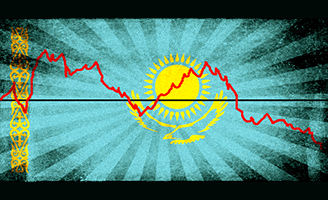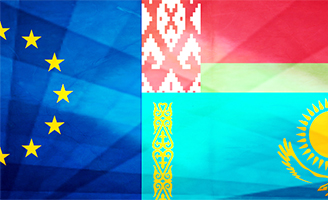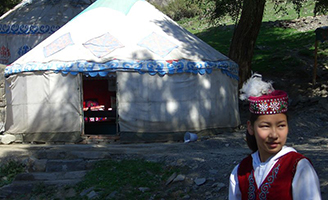CACI Analyst, April 29, 2015
Contents
Analytical Articles
RUSSIA'S REGULATION OF LABOR MIGRATION SET TO HURT CENTRAL ASIAN ECONOMIES, by Nurzhan Zhambekov
MOSCOW CFE KILL THREATEN CAUCASUS STABILITY, by Richard Weitz
CAUCASUS EMIRATE FACES FURTHER DECLINE AFTER THE DEATH OF ITS LEADER, by Emil Aslan Souleimanov
KAZAKHSTAN AND NEIGHBORS SEEK STRATEGIES TO COUNTER EMERGING THREATS, by Jacob Zenn
Field Reports
KYRGYZSTAN'S PRIME MINISTER RESIGNS, by Arslan Sabyrbekov
ISLAMIC STATE REACHES OUT TO GEORGIA, by Eka Janashia
ARMENIA'S PRESIDENT VISITS THE VATICAN, by Erik Davtyan
AZERBAIJAN DEMOTED TO EITI CANDIDATE, by Mina Muradova
CACI Analyst, April 1, 2015
Contents
Analytical Articles
IRAN, A NUCLEAR TREATY, AND ITS NEIGHBORS, by Stephen Blank
THE PROSPECTS OF IS IN AFGHANISTAN, by Sudha Ramachandran
AZERBAIJAN AND KAZAKHSTAN FACE TOUGH ECONOMIC DECISIONS AMID DECREASING OIL PRICE, by Nurzhan Zhambekov
CONFLICT-RELATED VIOLENCE DECREASES IN THE NORTH CAUCASUS AS FIGHTERS GO TO SYRIA, by Huseyn Aliyev
Field Reports
KYRGYZSTAN'S PRESIDENT MAKES UNANNOUNCED VISIT TO MOLDOVA, by Arslan Sabyrbekov
PRIVATIZATION IN UZBEKISTAN: THE NEXT DOUBLE, by Umida Hashimova
ACUTE POLITICAL CONFRONTATION SIMMERS IN GEORGIA, by Eka Janashia
TAJIKISTAN'S OPPOSITION SUFFERS KIDNAPPINGS AND ASSASSINATIONS, by Oleg Salimov
Hanging in The Trade Balance: Is Free Trade a Curse for Kazakhstan?
By Sergei Gretsky (06/10/2015 issue of the CACI Analyst)
The creation of the Eurasian Economic Union (EEU) was presented as a vehicle for economic development of Belarus, Kazakhstan, and Russia as a result of the removal of barriers to free movement of goods, capital, and labor between the three states and creating a common market. Its inauguration on January 1, 2015, happened at a very inopportune moment as Russian economy, the largest of the three, was sharply contracting due to falling global commodity prices and western sanctions over Ukraine. Economic recession in Russia has had a negative ripple effect on Belarusian and Kazakhstani economies, which led some in Kazakhstan to second-guess the benefits of joining the EEU.

Election Year in the Eurasian Union and the EU's External Action Policies
By Gaël Chataignère (05/27/2015 issue of the CACI Analyst)
EU policies toward the two junior members of the Eurasian Union are an indication of the EU’s struggle to balance its normative, geo-economic, and political interests in the former Soviet space. This April, Nursultan Nazarbayev secured a fifth term in office with a full 97.7 percent of the vote, prompting only a mild response from the EU. The European External Action Service simply reiterated the conclusions of the OSCE observation mission, and the importance of the EU’s partnership with Kazakhstan. Meanwhile, despite an ongoing diplomatic thaw, Belarus remains subjected to a comprehensive set of EU sanctions. This seeming paradox questions the consistency and priorities of the EU, just a few months before Belarus holds its own presidential election.

Kazakhstan to Reform Its Cultural Sector
By Rafis Abazov and Andrey Khazbulatov (05/13/2015 issue of the CACI Analyst)
In his presidential election campaign, Kazakhstan’s President Nursultan Nazarbayev pledged special attention to cultural policy through implementation of the Concept of Cultural Policy, envisioned to streamline the country’s policies on culture, cultural education and arts to strengthen what he calls “the genetic [cultural] code of the nation.” In introducing this Concept, Kazakhstan’s government emphasizes cultural policies despite the current financial crisis and significant budget cuts due to falling oil prices in the international market. But will reforming its cultural sphere deliver expected outcomes and results?









 Book S. Frederick Starr and Svante E. Cornell,
Book S. Frederick Starr and Svante E. Cornell,